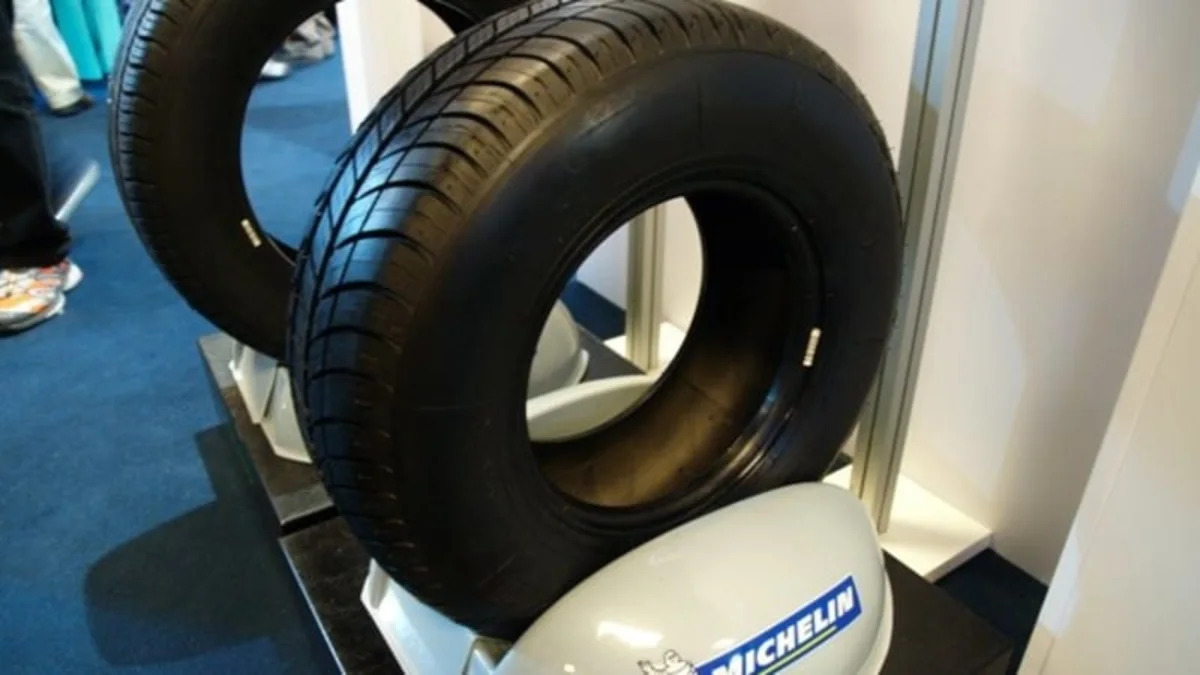For the tenth time in twelve years, Michelin is sponsoring something called the Challenge Bibendum. This global event has been held in Europe, the U.S., Asia and, now, Brazil. Michelin invited us down to check of some of the work people are doing to improve the fuel efficiency of vehicles around the world. We'll have those reports up throughout the rest of the week, but we wanted to start by understanding why a tire company would go through all the trouble of organizing this many people and cars so many times in so many places. The short answer is that Michelin is able to learn a lot from these events, and that helps the company make the tires that car companies might not know they want yet.
For example, Didier Miraton, one of Michelin's three managing partners (the company doesn't have a CEO) said:
To that end, Michelin is showing off some new tires developed specifically for electric vehicles. Dick Wilkerson, chairman and president of Michelin North America, said that the company is in a good place as far as knowing how to make tires for this purpose, but:
Our travel and lodging for this media event were provided by the Michelin.
For example, Didier Miraton, one of Michelin's three managing partners (the company doesn't have a CEO) said:
Read on after the jump to find out more about Michelin's thoughts regarding tires and efficiency. After all, as one exec told us, tires impact fuel economy by one to three percent and Michelin has said it is committed to making more fuel efficient tires that, on average, reduce emissions by one gram of CO2 per kilometer per year.Working through the Challenge Bibendum and with all of the players in the electrical mobility industry, we came to realize that autonomy [i.e., range] on an electrical urban vehicle was 30 to 40 percent linked to the fuel efficiency of the tire, therefore, it gave us the thrust to go into the direction of the low-emission tire, the urban electrical vehicle tire, that would provide very fuel low efficiency not just to reduce CO2 impact but actually to allow this kind of vehicle to run because it would bring autonomy that would make them viable.
To that end, Michelin is showing off some new tires developed specifically for electric vehicles. Dick Wilkerson, chairman and president of Michelin North America, said that the company is in a good place as far as knowing how to make tires for this purpose, but:
Terry Gettys, director of the research and development process of the Michelin Group, added:So, if you say how are we doing on the design of electric vehicle tires, the answer would be, 'We're doing well, but." There is plenty of room ahead. We know there are other things to discover.
Michelin is, like the rest of the industry, looking to the developing countries for future growth. Florent Menegaux, president of Michelin's passenger car division, said that these countries are looking for robust, long-lasting tires and, "they are a little bit less sensitive towards fuel efficient tires but we have clear signal that it is growing very fast as a requirement." He said he can't rank countries and say which is the most interested in a greener tire, but that China and Brazil are most certainly towards the top of the list. Menegaux:Fundamentally, designing tires for electric vehicles is not different than for engined vehicles. We are working with car manufacturers to see what specific tuning they require. Many of them, for example, are targeting urban applications, city environments, so they are looking more at lower speed, very low noise tuning. As a result, the tires may be tuned that way, but the fundamental performances are not changed. You still need the impact for handling and comfort, you still need to try and optimize the rolling resistance. The tires that we are demonstrating optimized for electric vehicles go in two design directions. One of them is a very small tire with a very small rim, a 10-inch rim. It's pretty much a standard rim, but sized small. The vehicle manufacturer has downsized the brake system as well, inspired by some racing systems. ... The other concept is a 21-inch tire ... a tall and narrow tire. That's optimizing packaging in the vehicle in a different manner, optimizing the vehicle width space of the vehicle as well as [aerodynamics].
So, Michelin holds the Challenge Bibendum to learn and to make better tires. Seems reasonable enough to us. We'll have more from Rio soon.China is clearly signaling that they are conscious that they have to grow with a good balance with respect to their environment. So they cannot accmodate such phenomenal growth without taking care of the environment, like Brazil. Brazil has been more conscious about sustainable development for many years.
Our travel and lodging for this media event were provided by the Michelin.


Sign in to post
Please sign in to leave a comment.
Continue